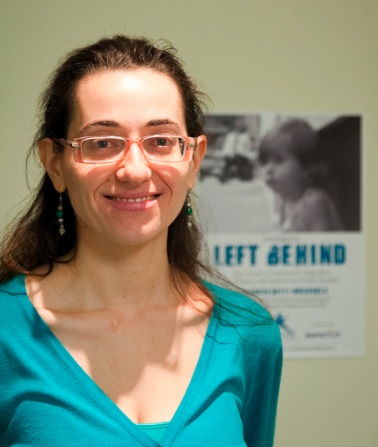CONFERENCE | by Camilla Azzini
Left Behind – Brussels Conference: Adriana Opromolla
 Biographical note:
Biographical note:
Adriana Opromolla holds a LL.M in EU Law and a Master’s Degree in Human Rights. She rained and qualified as a lawyer at the Bar of the city of Salerno (Italy) in 2003. She has worked for the Legal Service of the European Commission, the Registry of the European Court of Human Rights and the Human Rights Directorate of the Council of Europe. She has been working in Brussels for eight years as a lobbyist on Human Rights, Justice and Social Policy. She is currently responsible for policy development and advocacy on poverty and social inclusion, with particular focus on child poverty, at Caritas Europa. She has been a member of expert bodies of the Council of Europe for the elaboration of the Convention against Trafficking in Human Beings and for a study project on the Human Rights of People living in Poverty. She has intervened as a speaker and lecturer in numerous international conferences, seminars and symposia. Her publications cover topics such as children’s rights, social rights and globalisation.
Abstract of presentation:
“Orphans” of migrants: Poverty of the Future
In the Caritas experience, having parents who are labour migrants in another country is detrimental for children’s emotional well-being. Some Eastern European countries have experienced massive migration of people to work abroad. Many of these labour migrants leave their children behind – either to live with relatives or alone in their home country. Especially when migration is irregular there is no or little possibility for parents to visit their children back at home. Thus, many children have to live without their parents for a long time.
In 2008, Caritas Moldova reported that about 30% of children in Moldova had their parents working abroad; this issue represents a worrying problem also in Poland and Ukraine. Even if these children have material security – because their parents send them money – the absence of and separation from their parents often is a cause of traumatism for the. Thus, children whose parents are abroad may feel lonely, emotionally abandoned and laking protection.
Up to now there are no EU or national policy measures to improve the situation of these children. Clearly, this is a big challenge for the states concerned. The presentation will illustrate examples of how Caritas organisations in Eastern and Western countries are responding to this problem, and what policy measures would be opportune to tackle this form of “hidden poverty”.
Download Power Point presentation

